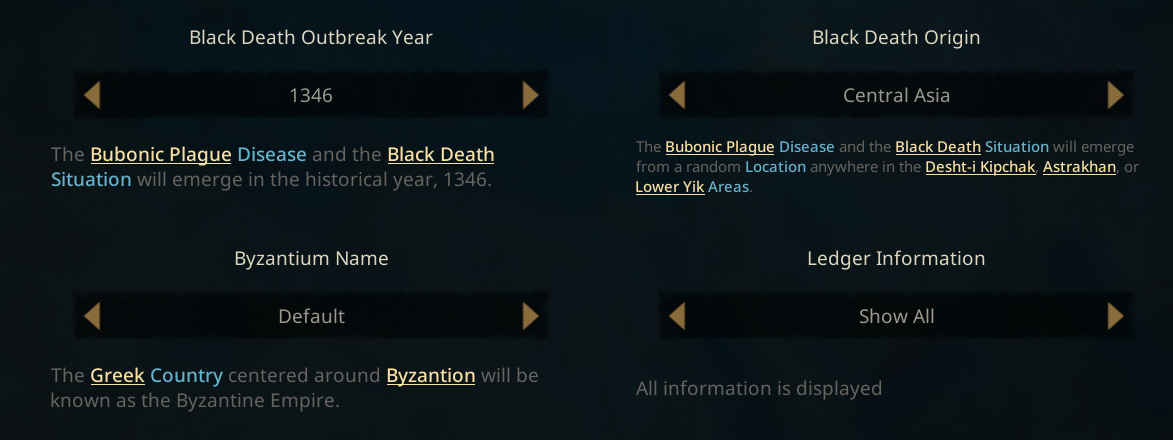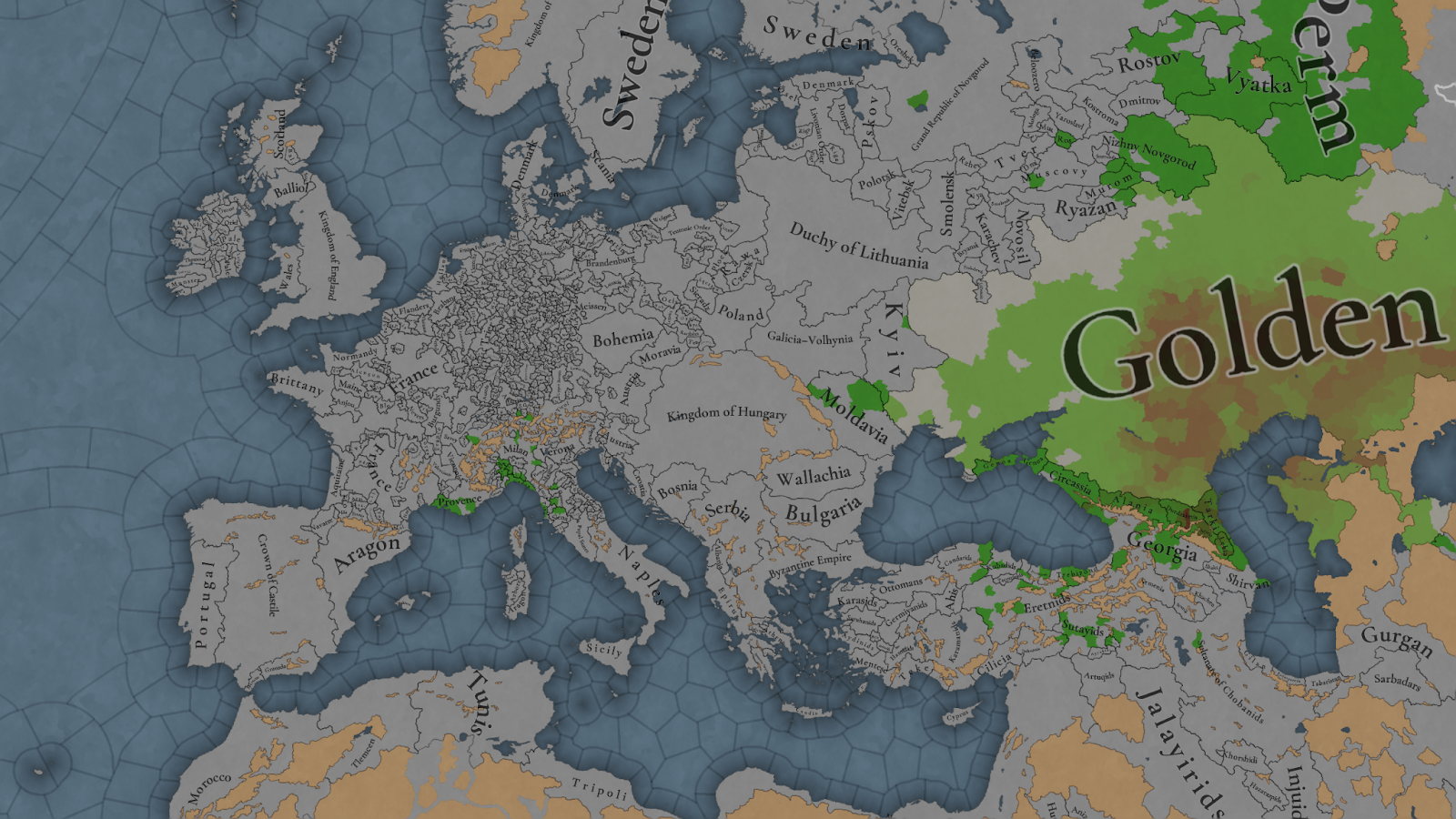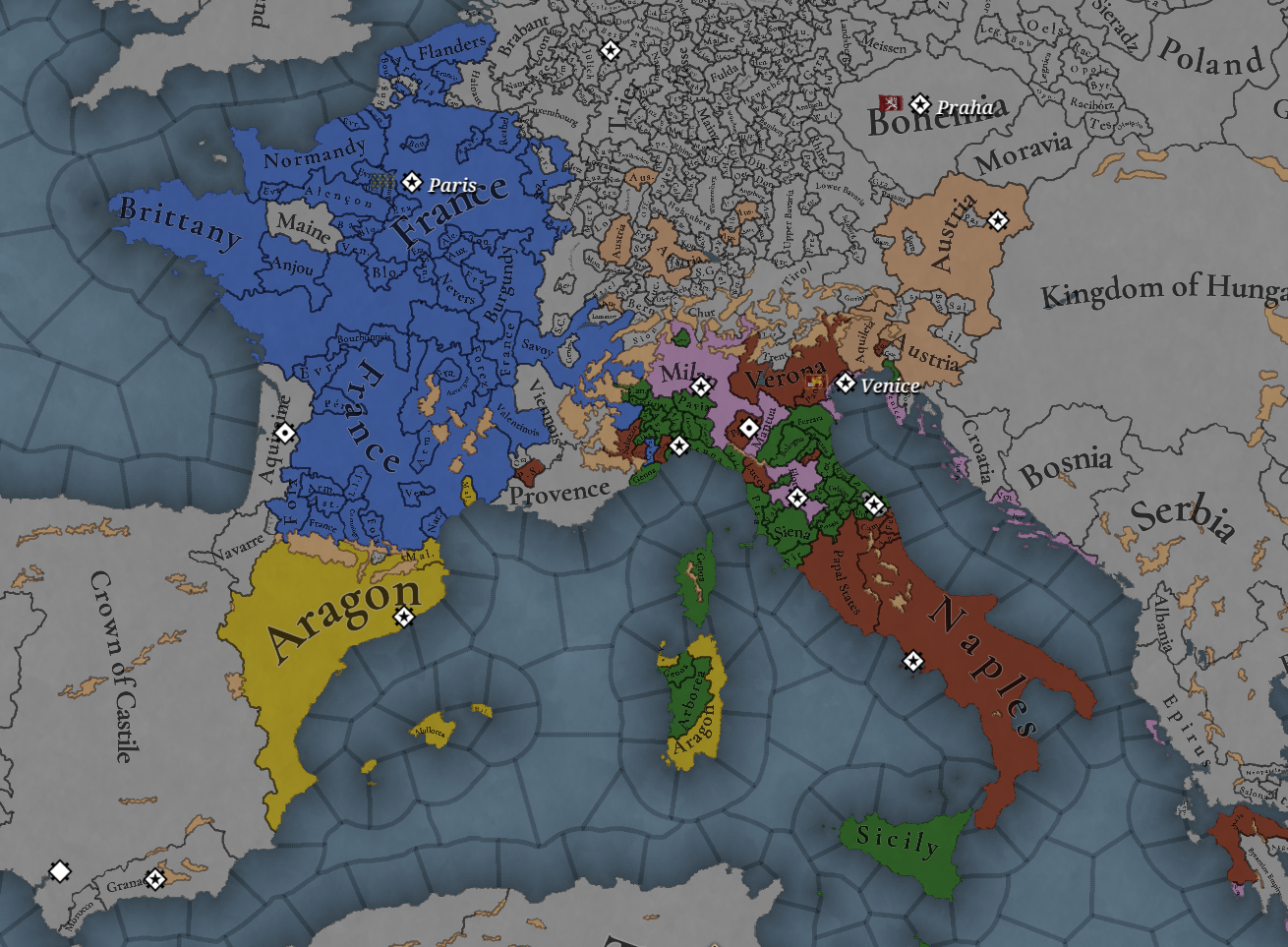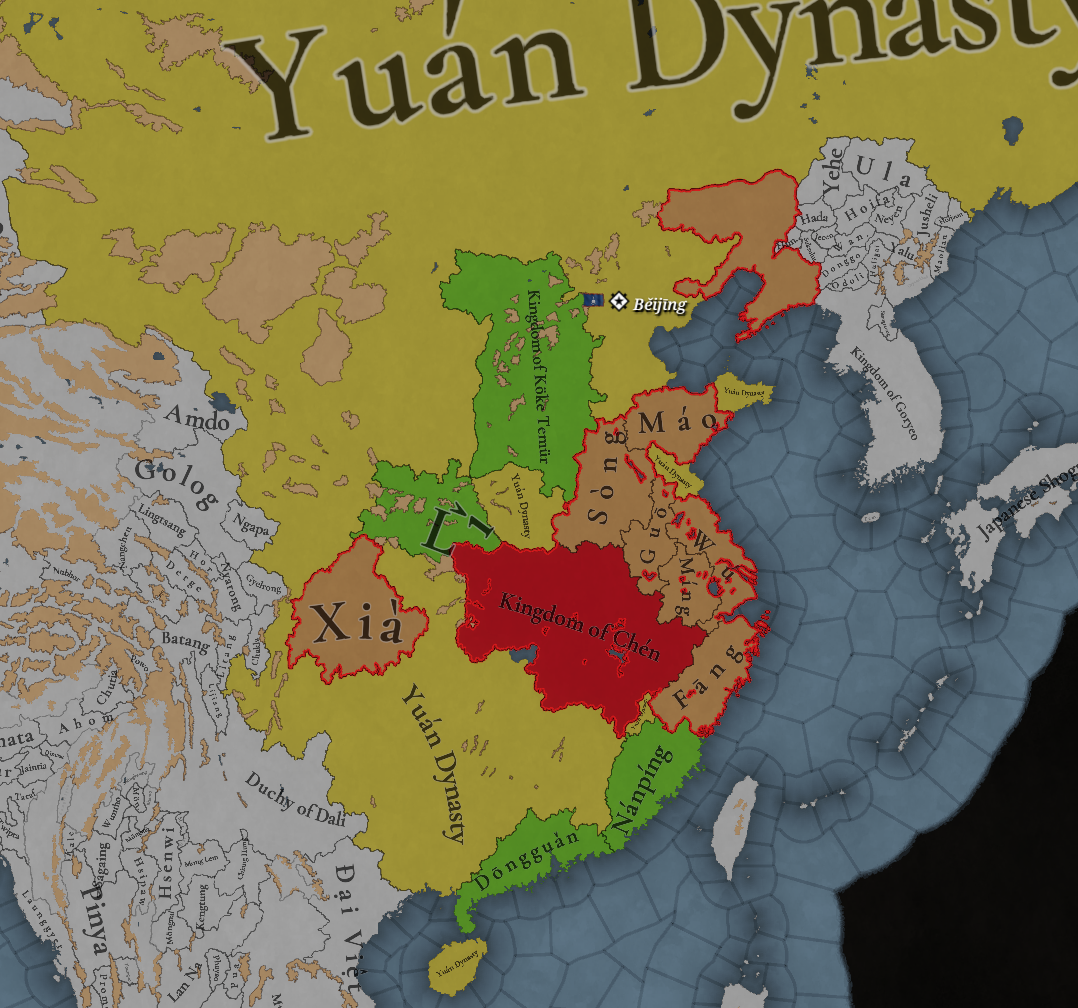Welcome everyone to where we talk about our completely secret, not yet announced game. In today's Tinto Talks we will delve into a completely new feature.
A small reminder, this is very much a WiP, and nothing is final.
The core of this system was one of the first things I designed back in the spring of 2020, a feature that could be described as both a narrative and mechanical guide for the game. This is something that has been inspired by the Incident System from EU4, and also by the International Crisis mechanic of Victoria 2, but it is not really like any of those.

Today is when we introduce our new Situation System.
So what is a “Situation” then? Good question. You could describe it as content that involves multiple countries over a period of time. In Project Caesar, we are using this feature to create a historical narrative that creates different experiences, as our goal is to have an immersive and varied experience for the player.
A Situation can have unique actions, events that trigger, and other types of unique content, and each of them will have its own UI and mapmode.
If a situation may involve or affect you, it will show with an alert, in the new color of purple!
Let's take a look at some of the situations we have in the game right now.
Black Death
This was the first situation we created, and it has been going through many revisions during the last four years.

Black death can be 1346, random or off, and origin can be historical or random.
Usually, it will happen from 1346, as the Bubonic Plague appears somewhere in Central Asia and starts spreading through the old world, killing 40-60% of the population of the affected areas.
It spreads through adjacencies, moving armies, or through trade. There are ways you can attempt to alleviate this, but the efficiency of it is low, and the cost is high. You can try to isolate your court, expel the sick, blame minorities, and other very efficient ways to deal with the problem.

Slowly spreading centrally, but some traders have already taken it into Italy...
Italian Wars
In the Age of Discovery, this is probably the most important situation for anyone in Western Europe. It is about control over Italy and will happen as soon as a French or Iberian Major Power or the Emperor declares war on an Italian Power.
There will be up to six different leagues that will fight over control of Italy. There is a French league, an Iberian league, the Emperor's league, and up to 3 Italian leagues. The first two will dynamically select their leaders based on strength calculations.
If one league gets hegemony over Italy, i.e. owning over 60% of the region either through conquest or diplomacy, then they will win. The Italians can also win by making sure the foreign leagues are destroyed through a special peace deal.
Leagues can be abandoned and anyone owning locations in Italy can join one of them.
The situation allows enemies and rivals of foreign league leaders to intervene and assist the defending Italians and it also grants access to unique interactions in order to send aid of any kind, attract cheaper condottieri and even create a new Italian league.

This is how the situation would look if it fired in 1337 if Austria was to be the Holy Roman Emperor and Aragon was the dominant power in Iberia with vested interests in Italy.
Red Turban Rebellions
This is rather likely to happen as soon as the Yuan Empire ends up at low stability.
It will create an international organization called The Red Turbans, which will get a lot of rebel countries.
The situation can happen to Yuán after 1350 if their stability drops below 25 while also either of their estates is not satisfied. The requirements are harsh, but once you reach the Age of Discovery you have avoided the situation.
With that being said, the situation will most likely fire in a playthrough. During this period, the Red Turban Rebels will spawn as an international organization which is in direct opposition to the Huángdì, the Chinese emperor. While the situation is going on, events will pop up that force Yuán to release historical Chinese tags in their historical order (so the first Sòng is released, then Wú, then Tiānwán, etc.), which join the IO and immediately declare their own, independent war on Yuan.
Each rebel nation is playable when it spawns, and they can wage war with each other too.
The countries spawned during this situation have a custom loyalty value which describes how, well, loyal they are to Yuán which goes from -100 to 100 and grows or shrinks depending on their opinion of Yuán. Most rebel nations will start at -100 as they actively fought against Yuan. However, some nations spawned through the situation represent the Mongolian generals who gained a lot of autonomy, but were still fighting for Yuán’s cause. They would spawn with +50 Loyalty. If any rebel country reaches more than 0 loyalty, they will automatically leave the Red Turban Rebels IO.
In order to end the situation as Yuán, you have to regain internal stability, but also ensure that the Red Turban Rebels have no members left anymore after 20 years of the start of the situation. All states spawned through the situation with over 50 loyalty will then automatically be annexed by Yuán.
On the other hand, the situation also ends once any rebel tag owns the majority of China (around 70%) of all the locations there. If that happens the rebel tag which fulfills this requirement will assume the Imperial Throne and take over the tag of China.
The situation unlocks special diplomatic actions for Yuán and the rebels alike. Yuán can grant titles to any released state that is not at war with it, giving a significant loyalty and opinion boost in exchange for a hefty fee. They can also negotiate with local rebellions which decreases the process for a rebellion to break out and they can call loyalist countries (those with +50 loyalty) to their wars against the Red Turban Rebels. Meanwhile, the rebel states have a special cb against Yuan and other rebel states with a vastly reduced warscore cost for Chinese locations. They also get access to an action that allows them to rein in a conquered area, greatly reducing the local integration speed.

Green are your loyal servants, orange are the rebels, red is the strongest of the rebels.
Other situations include things like the Western Schism, the Hundred Years War & Sengoku Jidai. We will talk more about those in future Tinto Talks.
If you have a suggestion of what you think would be an important historical event that should be a situation, then please post them here!
Next week though, we will talk about something that many people have asked for repeatedly.
A small reminder, this is very much a WiP, and nothing is final.
The core of this system was one of the first things I designed back in the spring of 2020, a feature that could be described as both a narrative and mechanical guide for the game. This is something that has been inspired by the Incident System from EU4, and also by the International Crisis mechanic of Victoria 2, but it is not really like any of those.
Today is when we introduce our new Situation System.
So what is a “Situation” then? Good question. You could describe it as content that involves multiple countries over a period of time. In Project Caesar, we are using this feature to create a historical narrative that creates different experiences, as our goal is to have an immersive and varied experience for the player.
A Situation can have unique actions, events that trigger, and other types of unique content, and each of them will have its own UI and mapmode.
If a situation may involve or affect you, it will show with an alert, in the new color of purple!
Let's take a look at some of the situations we have in the game right now.
Black Death
This was the first situation we created, and it has been going through many revisions during the last four years.
Black death can be 1346, random or off, and origin can be historical or random.
Usually, it will happen from 1346, as the Bubonic Plague appears somewhere in Central Asia and starts spreading through the old world, killing 40-60% of the population of the affected areas.
It spreads through adjacencies, moving armies, or through trade. There are ways you can attempt to alleviate this, but the efficiency of it is low, and the cost is high. You can try to isolate your court, expel the sick, blame minorities, and other very efficient ways to deal with the problem.
Slowly spreading centrally, but some traders have already taken it into Italy...
Italian Wars
In the Age of Discovery, this is probably the most important situation for anyone in Western Europe. It is about control over Italy and will happen as soon as a French or Iberian Major Power or the Emperor declares war on an Italian Power.
There will be up to six different leagues that will fight over control of Italy. There is a French league, an Iberian league, the Emperor's league, and up to 3 Italian leagues. The first two will dynamically select their leaders based on strength calculations.
If one league gets hegemony over Italy, i.e. owning over 60% of the region either through conquest or diplomacy, then they will win. The Italians can also win by making sure the foreign leagues are destroyed through a special peace deal.
Leagues can be abandoned and anyone owning locations in Italy can join one of them.
The situation allows enemies and rivals of foreign league leaders to intervene and assist the defending Italians and it also grants access to unique interactions in order to send aid of any kind, attract cheaper condottieri and even create a new Italian league.
This is how the situation would look if it fired in 1337 if Austria was to be the Holy Roman Emperor and Aragon was the dominant power in Iberia with vested interests in Italy.
Red Turban Rebellions
This is rather likely to happen as soon as the Yuan Empire ends up at low stability.
It will create an international organization called The Red Turbans, which will get a lot of rebel countries.
The situation can happen to Yuán after 1350 if their stability drops below 25 while also either of their estates is not satisfied. The requirements are harsh, but once you reach the Age of Discovery you have avoided the situation.
With that being said, the situation will most likely fire in a playthrough. During this period, the Red Turban Rebels will spawn as an international organization which is in direct opposition to the Huángdì, the Chinese emperor. While the situation is going on, events will pop up that force Yuán to release historical Chinese tags in their historical order (so the first Sòng is released, then Wú, then Tiānwán, etc.), which join the IO and immediately declare their own, independent war on Yuan.
Each rebel nation is playable when it spawns, and they can wage war with each other too.
The countries spawned during this situation have a custom loyalty value which describes how, well, loyal they are to Yuán which goes from -100 to 100 and grows or shrinks depending on their opinion of Yuán. Most rebel nations will start at -100 as they actively fought against Yuan. However, some nations spawned through the situation represent the Mongolian generals who gained a lot of autonomy, but were still fighting for Yuán’s cause. They would spawn with +50 Loyalty. If any rebel country reaches more than 0 loyalty, they will automatically leave the Red Turban Rebels IO.
In order to end the situation as Yuán, you have to regain internal stability, but also ensure that the Red Turban Rebels have no members left anymore after 20 years of the start of the situation. All states spawned through the situation with over 50 loyalty will then automatically be annexed by Yuán.
On the other hand, the situation also ends once any rebel tag owns the majority of China (around 70%) of all the locations there. If that happens the rebel tag which fulfills this requirement will assume the Imperial Throne and take over the tag of China.
The situation unlocks special diplomatic actions for Yuán and the rebels alike. Yuán can grant titles to any released state that is not at war with it, giving a significant loyalty and opinion boost in exchange for a hefty fee. They can also negotiate with local rebellions which decreases the process for a rebellion to break out and they can call loyalist countries (those with +50 loyalty) to their wars against the Red Turban Rebels. Meanwhile, the rebel states have a special cb against Yuan and other rebel states with a vastly reduced warscore cost for Chinese locations. They also get access to an action that allows them to rein in a conquered area, greatly reducing the local integration speed.
Green are your loyal servants, orange are the rebels, red is the strongest of the rebels.
Other situations include things like the Western Schism, the Hundred Years War & Sengoku Jidai. We will talk more about those in future Tinto Talks.
If you have a suggestion of what you think would be an important historical event that should be a situation, then please post them here!
Next week though, we will talk about something that many people have asked for repeatedly.


